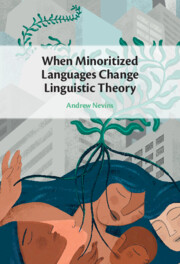Book contents
- Frontmatter
- Dedication
- Frontmatter
- Contents
- Figures
- Acknowledgments
- Abbreviations
- Map
- 1 Expanding the Canon: Minoritization in the World and in Linguistic Theory
- 2 Indexical Shift in Zazaki and Uyghur
- 3 Why Ergative Case Requires Structure in Basque and Ch’ol
- 4 Closest Conjunct Agreement in Slovenian and Xhosa
- 5 Configurationality of Objects in Chichewa and Warlpiri
- 6 Partial Nasality in Maxakalí and Kaingang
- 7 Symmetric Hands in Sign Language Phonologies
- 8 Number-Encoding on Verbs in Hiaki and Chechen
- 9 Conclusion: Towards Healthy Futures in the Language Sciences
- Bibliography
- Index
8 - Number-Encoding on Verbs in Hiaki and Chechen
Published online by Cambridge University Press: 18 November 2022
- Frontmatter
- Dedication
- Frontmatter
- Contents
- Figures
- Acknowledgments
- Abbreviations
- Map
- 1 Expanding the Canon: Minoritization in the World and in Linguistic Theory
- 2 Indexical Shift in Zazaki and Uyghur
- 3 Why Ergative Case Requires Structure in Basque and Ch’ol
- 4 Closest Conjunct Agreement in Slovenian and Xhosa
- 5 Configurationality of Objects in Chichewa and Warlpiri
- 6 Partial Nasality in Maxakalí and Kaingang
- 7 Symmetric Hands in Sign Language Phonologies
- 8 Number-Encoding on Verbs in Hiaki and Chechen
- 9 Conclusion: Towards Healthy Futures in the Language Sciences
- Bibliography
- Index
Summary
This chapter examines number-marking in suppletive verbs in Hiaki, with pluractionality in Chechen, and without an overt mass/count distinction in Dëne Suliné. The grammatical encoding of number is one of the most varied areas of all cross-linguistic variation, and our syntax–semantics models cannot restrict themselves to limited samples of a handful of nonminoritized languages if our aim is to develop nonbrittle theories and truly challenge the view that English is as ‘equally’ representative of the human language faculty as any other language we choose to start from.
Information
- Type
- Chapter
- Information
- When Minoritized Languages Change Linguistic Theory , pp. 137 - 162Publisher: Cambridge University PressPrint publication year: 2022
